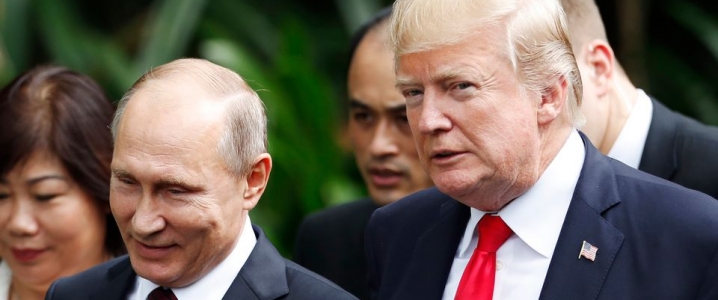Relations between the United States and Russia have deteriorated dramatically over the years due to Moscow’s intervention in neighbouring Ukraine and its annexation of Crimea. This change in foreign policy has some analysts talking about a ‘new cold war'. Moscow's participation and support for President Assad of Syria put Russian interest and soldiers against America’s. One of the reasons the intervention took place during the height of the Ukraine crisis was the Kremlin’s intention to reduce the effectiveness of the isolationist policy of the West vis-à-vis Russia by making itself indispensable for solving the crisis.
The alleged meddling of Moscow in the American presidential elections of 2016 created a political minefield for President Donald Trump when trying to meet with President Vladimir Putin of Russia. Although they have spoken several times on the fringes of international events such as the G20 gathering in 2017, an official bilateral visit has not yet been organised. Recent developments, however, have provided an opening for both leaders. Besides the civil war in Syria and the ongoing conflict in Ukraine, coordination in the energy domain has proven to be another reason for communication.
The recent unilateral withdrawal of the United States as a signatory to the JCPOA, or the Iran Nuclear Deal, requires the cooperation of major energy producers to absorb the shocks of Trump’s decision. In order to isolate Iran and deprive it of financial resources, it is imperative for the U.S. administration to reduce the export of Iranian oil. However, as Iran is a major exporter of oil with 2,6 million barrels/day, withholding the world’s markets this amount in the current situation, will seriously increase prices. With midterm elections on the horizon for 2018, President Trump fears higher prices for the summer driving season will negatively affect support for Republican candidates.
Enter the fray Russia and OPEC. Although the U.S. president has lambasted OPEC for “artificially increasing the price of oil”, cooperation with other major producers is the only viable alternative for the U.S. administration to keep prices in check while isolating Iran. The U.S. apparently has quietly asked Saudi Arabia and some other producers of OPEC to increase production with 1 million barrels/day. Related: The European Nation Turning Its Back On Russian Gas
It is in Riyadh’s interest that the prices remain as high as possible as it would provide highly needed revenues and it would ensure the maximum result on the coming IPO of 5% of the national Saudi Aramco oil company. Saudi Arabia, however, seems to have listened to the heeded calls and advice from partners and allies. During the meeting this June in Vienna, OPEC in cooperation of non-members such as Russia and Mexico agreed to increase the daily production with one million barrels/day.
Just days after the agreement to boost oil production, U.S. energy secretary Rick Perry is expected to meet with his Russian counterpart energy minister Alexander Novak at the World Gas Conference. It is expected that the U.S. will discuss cooperation in light of sanctions kicking in this summer for Iranian oil exports. Moscow welcomes cooperation with Washington as it proofs the indispensable position of Russia in world affairs.
Furthermore, a cooperation of some sorts between the two countries is a good precursor for the upcoming meeting between the Russian and American presidents on 16th of July in Helsinki. National security advisor John Bolton has met with Russian foreign minister Sergei Lavrov on 26 June in Moscow in order to discuss a meeting between Trump and Putin and its possible content. Coordination in the energy domain could pave the way for the upcoming visit.
Unlike other partners, the modest bilateral trade and the corresponding deficit between the U.S. with Russia, respectively $24 and $10 billion in 2017, will most likely not lead to a trade war. Therefore, Moscow could make use of the opportunity to improve relations with Washington in areas of agreement while lacking serious imperatives such as trade.
By Vanand Meliksetian for Oilprice.com
More Top Reads From Oilprice.com:
- Can Trump Counter Soaring Gasoline Prices?
- This Country Just Started Pumping Oil For The First Time Ever
- How Important Are Egypt’s Gas Discoveries?



















While Saudi Arabia can’t refuse a request from President Trump, President Putin will never be part of a scheme to tighten US sanctions on his ally Iran. If he agrees to raise oil production, it is not to help President Trump tighten the sanctions on Iran and save his neck at the midterm elections but because Russian oil is overwhelmingly produced by privately-owned Russian oil companies in which the government has a small stake. These companies have invested heavily in exploration and production-capacity expansion over the last few years and they are therefore interested in maximizing their production and profits as soon as possible.
However, if President Putin was to help President Trump in preventing oil prices from hitting the roof and thus saving his Republican party in the November elections, he will demand a quid pro quo in some US sanctions-relief against Russia. It remains to be seen as to whether President Trump can make such a peaceful gesture towards Russia during their summit meeting on the 16th of July in Helsinki against a US Congress adamantly accusing Russia with meddling in US presidential elections in 2016.
Though a small step, an understanding between the United States and Russia over oil prices might pave the way for a bigger understanding over Syria, North Korea and even possibly Iran.
Saudi Arabia’s interest in high oil prices has nothing whatsoever to do with the IPO of Saudi Aramco. I have repeatedly been saying for the last six months that Saudi Arabia will soon withdraw the IPO quietly altogether as it no longer needs the money from the IPO in view of rising oil prices.
Dr Mamdouh G Salameh
International Oil Economist
Visiting Professor of Energy Economics at ESCP Europe Business School, London